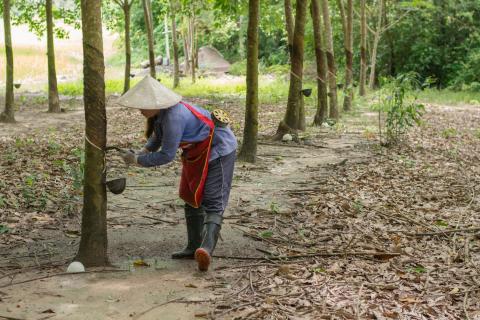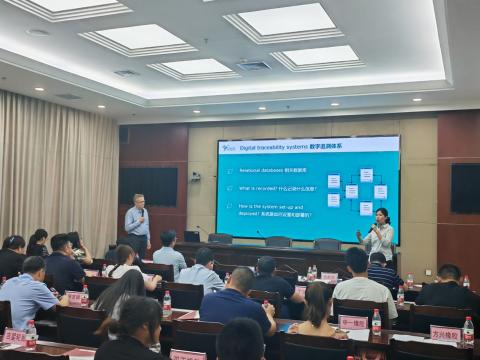SBP certified rubber wood to generate new jobs in Ivory Coast
As the global appetite for wood chips and pellets receives a boost from green transitioning, critics of the biomass industry are casting doubt on its sustainability. In Ivory Coast, a small Danish company may be proving the critics wrong.
Chopping up wood in a West African country already heavily impacted by deforestation, then transporting it hundreds of miles by sea in heavy fuel consuming bulk vessels and finally loading it into incinerators to be burned for heat and electricity.
It may not sound like an environmentalists’ dream scenario. It is, nevertheless, the business model of a small Danish upstart, which has found a way to turn wood waste from rubber plantations into biomass gold. And it hardly gets more sustainable than this, says Klaus Kroll, a former security director for shipping giant Maersk, who is running the operation on the ground together with his business partner Bo Christensen.
“This is waste. When the rubber trees reach 32-35 years of age, they are no longer producing any rubber. A small part of them may be used as fuel for cooking in local restaurants, but mostly the locals just pour petrol over and burn it,” said Klaus Kroll.
According to Klaus Kroll, 20.000 tons of wood chips from the plantation in Ivory Coast will soon reach a port in Denmark, where transition policies including certain tax credits on biomass have created a significant demand for wood chips and pellets to fuel several newly built large-scale power plants.
“Initially we did some testing to see if we could convert it into sawn wood, but the chemical process to get rid of beetles and other insects is very complex and the whole operation ends up being too costly. This is a much simpler process,” said Klaus Kroll.
His company Societé Bioenergie Cote D’Ivoire (SBIOCI) is planning to export 75.000 to 125.000 tons annually, soon to be expanded with more production lines, and recently received SBP certification (Sustainable Biomass Program), which according to Kroll helps placing SBIOCI ‘in the right box’.
“Certification is a great help. It’s a tool for pushing standards in the right direction. The risk mitigation built into the standard has become a life philosophy for our business,” said Klaus Kroll.
Soaring demand
According to the World Bioenergy Association, biomass has a 96 percent share of the renewable heat market globally. The forestry sector is the largest single contributor to the global bioenergy mix, supplying 85 percent of all biomass used for energy purposes, totaling 1.9 billion m3 of woodfuel in 2019.
Denmark has been spearheading the use of renewable energy since the seventies, when the economy was severely hit by the oil crisis. Today, however, the capacity for converting biomass into heat and electricity is larger than the local supply of solid biomass will allow for and more than 40 percent has to be imported from other countries, primarily from Russia and The Baltics.
Lately the soaring demand for woodfuel has been stoking fears that it will accelerate deforestation and environmental groups are now pushing Danish politicians to roll back policies, which were until recently considered green.
Ondrej Tarabus, Manager of NEPCon Responsible Biomass Programme, has been leading the certification audit in Ivory Coast. He believes the business concept of turning end-of-life rubber wood from these plantations into energy is already creating significant environmental and social progress.
“SBIOCI has introduced safety standards, fair pay, right to sick leave and healthcare, which is benefiting thousands of workers. Before they had nothing,” said Ondrej Tarabus.
“Of course, certification is no guarantee that everything is run perfectly, but without this system, I think it is unlikely there would be any change, because nobody would be pushing for it. Great things are happening now. As someone who considers himself a green person, I think this is really cool,” said Ondrej Tarabus.
Raising the bar
Back on the plantation, Klaus Kroll proudly describes how his operation is creating progress by introducing SBP standards: Workers are now wearing bright new safety gear, the pay for workers have gone up considerably and management is actively urging employees to join a union.
“There was a rumor floating amongst our subcontractors that we didn’t allow workers to join a union. So, we offered to pay the signup fee for anyone who wished to join. Of course we should all have the right to join a union,” said Klaus Kroll.
Most certification audits include registering critical issues such as complaints from local stakeholders, so action can be taken. This is mostly an open and transparent process, which allows the general public access to the data on a website. Sometimes journalists and NGO’s will highlight these issues in campaigns and media coverage, not mentioning – or not understanding - the fact, that the issue has been registered because it is in the process of being addressed.
Klaus Kroll still believes it is worth the risk of ‘bad press’.
“This is not a perfect world and I will never be able to guarantee you that critical issues will not pop up. But we are introducing standards, raising the bar and hopefully what we do will be replicated by others,” said Klaus Kroll.
No standards for smallholders
While SBP was originally designed for less challenging regions such as the US and Europe, where governance, environmental and social standards may already be in place, these prerequisites are often missing in part or fully in West African countries. Ideally, says Ondrej Tarabus, SBP would have been used as an extension of an FSC FM certification, but this has not been possible, as, strangely, the world’s largest forest certification scheme is not covering this region.
Certification schemes are by nature more beneficial when used in large scale production, but as the forest and agricultural sectors in Ivory Coast are dominated by smallholder farms and plantations with average sizes ranging between 1.5 and 5.0 hectares, this represents a serious challenge, says Ondrej Tarabus. Smallholders produce more than half of the country’s agricultural output, but no certification scheme is offering a system to reach this group and create impact where it is really needed.
“We would of course like to see the impact on the small plantations, so they too can benefit from business opportunities like this. However, it’s a lot harder to prove sustainability on small farms and plantations. Companies are understandably worried they will risk losing their certificate, but they should nevertheless try to implement these standards in a way that will also cover small producers,” said Ondrej Tarabus.
Child labour “a red flag”
Ivory Coast is the world’s largest exporter of cocoa, much of which is grown by smallholders and outgrower plantations. Here, child labour is particularly rampant, and along main roads, large billboards advise that “children should go to school, not to work.” Time and again child labour cases involving multinational consumer brands appear in the international media, but no one seems to be able to fix this problem - or, as some argue, perhaps not enough is being done.
Although child labour cases related to rubber plantations have been less visible in the media, it is evidently an issue, which any company working in Ivory Coast should seek to mitigate.
“This is certainly a red flag, when we visit rubber plantations for potential investment. Sometimes hundreds of workers are living with their families inside the plantations. Child labour can under no circumstances be allowed on plantations we are working with. Full stop,” said Klaus Kroll.
Unfortunately, the risk of being associated with child labour is also one of the reasons why companies such as Societé Bioenergie Cote D’Ivoire will shy away from smallholders. Nothing can be more damaging to a company than a child labour accusation, while it is precisely the business of these companies, which can alleviate poverty and put children in school.
While Klaus Kroll is hoping that his business will “raise the bar”, create economic impact and improve long term sustainable practices, the environmental feasibility of huge bulk vessels transporting wood to be burned in power plants in a far off northern country still seems questionable. The answer is fairly simple, however.
Do we need it?
In order to receive various tax credits, Danish biomass importers have to prove a 72 percent CO2 emissions reduction compared to the fossil fuel being replaced. The entire supply chain is taken into account, including transport over land and sea, size of cargo and relative energy efficiency. Transporting large shipments of wood chips by sea is far more efficient than using trucks.
This leaves the overarching question: Do we really need wood based biomass?
“The simple answer is yes,” says Poul Erik Morthorst, Professor of Energy Economics and Head of Department at DTU Management Engineering in Copenhagen.
His areas of research include the integration of renewable energy in the Danish heating and energy systems, which is probably handy, when as a board member, he is advising The Danish Council on Climate Change.
“I don’t think we will be able to exclude wood based biomass sometime soon. We need the carbon, even to produce renewable energy. We believe waste wood is a very usable form of biomass. When withering away on the ground, it will release CO2 anyway, so it’s a perfectly suitable fuel for the energy sector,” said Poul Erik Morthorst.
The Danish scientist points to the fact that while Denmark is introducing heating pumps to cover most of the demand by 2030, few other countries will have the same convenient infrastructure to accommodate this kind of technology.
“The Paris Treaty is creating a global demand for biomass, especially for sustainable biomass. This is why we need certification. It’s the way forward.”
In Ivory Coast Klaus Kroll is toying with a new business idea:
“It’s another waste product, we discovered. In a couple of years, I believe we will be able to put certified biofuel in the bulk vessels bringing our wood chips to Denmark. But I’m not going to spill the beans and tell you what it is!”


